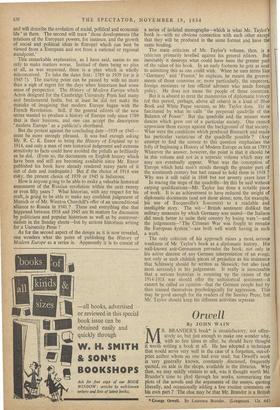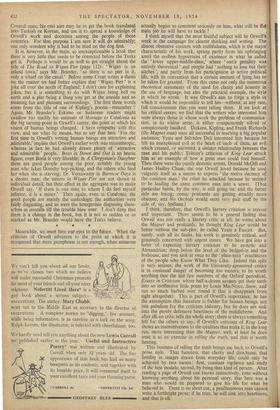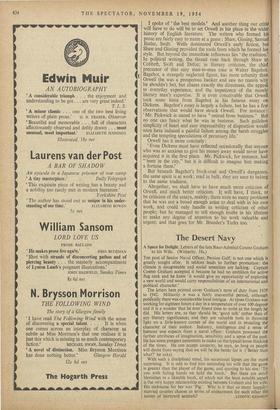Orwell
By JOHN WAIN R. BRANDER'S book* is unsatisfactory; not offen- sively so, but just enough to make one wonder why, with so few ideas to offer, he should have thought it worth writing a book at all. He has adopted a technique that would serve very well in the case of a forgotten, out-of- print author whom no one had ever read; but Orwell's work is very generally known, constantly discussed, frequently quoted, on sale in the shops, available in the libraries. Why then, we may mildly venture to ask, was it thought worth Mr. Brander's time to plod through his works. summarising the plots of the novels and the arguments of the essays, quoting liberally, and occasionally adding a few routine comments on his own part ? The clue may be that Mr. Brander is a British Council man; his real aim may be to get the book translated into Turkish or Korean, and use it to spread a knowledge of Orwell's work and doctrines among the people of those countries. For that purpose I am sure it will do admirably; one only wonders why it had to be tried on the dog first. It is, however, in the main, so unexceptionable a book that there is very little that needs to be corrected before the Turks get it. Perhaps it would be as well to get straight about the title of The Road to Wigan Pier (page 112): Wigan is an inland town,' says Mr. Brander, so there is no pier in it, only a wharf on the canal.' Before some Croat writes a thesis on the matter we had better explain that ' Wigan Pier' is a joke all over the north of England; I don't care for explaining jokes, but it is something to do with Wigan being hell on earth and a pier being a 'thing you get at the seaside and so meaning fun and pleasant surroundings. The first three words come from the title of one of Kipling's poems—remember ? Again, Mr. Brander's Eskimo or Sudanese readers might swallow too readily his estimate of Homage to Catalonia as the big turning-point in Orwell's career, the point at which his vision of human beings changed. I have sympathy with this view, and see what he means, but to say that here For the first time in Orwell's writing human beings are attractive and admirable,' implies that Orwell's earlier work was misanthropic, whereas in fact he had already drawn plenty of attractive and admirable' people. Bozo in Down and Out is an heroic figurer even Boris is very likeable; in A Clergyman's Daughter there are good people among the poor, notably the young man who takes Dorothy hop-picking, and the others who feed her when she is starving; Dr. Veraswamy in Burmese Days is a decent man; the miners in Wigan Pier are not shown in individual detail, but their effect in the aggregate was to make Orwell say, If there is one man to whom I do feel myself inferior, it is a miner.' Then again, even in Catalonia, the good people are mainly the underdogs; the authorities were fairly disgusting, and so were the bourgeoisie disguising them- selves in overalls till the trouble blew over. I don't deny that there is a change in the book, but it is not so sudden or so marked as Mr. Brander woiild have the Turks believe.
* * * Meanwhile, we must turn our eyes to the future. When the criticism of Orwell advances to the point at which it is recognised that mere paraphrase is not enough, when someone actually begins to comment seriously on him, what will be die main job he will have to tackle ?
I think myself that the most fruitful subject will be Orwell's work in the campaign for clearer thinking and writing. The almost obsessive concern with truthfulness, which is the major characteristic of his work, sprang partly from his upbringing amid the endless 'hypocrisies of existence in what he called the lower upper-middle-class,' where one's gentility was entirely theoretical ' and people had nothing to lose but their aitches '; and partly from his participation in active political life, with its convention that a certain amount of lying has to be taken for granted. From this came not only the numerous theoretical statements of the need for clarity and honesty in the use of language, but also the practical example, the style in which he wrote. It was Orwell's aim to forge a style in which it would be impossible to tell lies—without, at any rate, full consciousness that you were telling them. If we look at his critical essays, we find that the writers who interested him were always those in whose work the problem of communica- tion, in its widest sense, is either conspicuously solved or conspicuously baulked. Dickens, Kipling, and Frank Richards (the Magnet man) were all successful in reaching a big popular audience; Yeats and Salvador Dali interested him because he felt an unexplained evil at the heart of each of them, an evil which created, or mirrored, a sinister relationship between the man and his public; Tolstoy's criticism of King Lear struck him as an example of how a great man could fool himself. Then there were the purely demotic artists, Donald McGill and James Hadley Chase; the one Orwell loved because he used vulgarity itself as a means to express the native decency of the common man,' the other he attacked because he seemed to be leading the same common man into a sewer. (That particular battle, by the way, is still going on, and the better side are losing; comic postcards are getting steadily more obscene, and No Orchids would seem very pale stuff by the side of, say, Spillane.) I think, therefore, that Orwell's literary criticism is serious and important. There seems to be a general feeling that Orwell was not really a literary critic at all; he. wrote about the Magnet and postcards; he thought King Lear would be better without the sub-plot; he called Yeats a Fascist. But, surely, with all its faults, his work is genuinely critical, and genuinely concerned with urgent issues. We have got into a habit of expecting literary criticism to be esoteric and Alexandrian; drop below the level of the hedged-in and the hothouse, and you sink at once to the plain-man ' eructations of the people who Know What They Like. Indeed this split is very serious; the work of the University-ponsored critics is in continual danger of becoming too esoteric to be worth anything (see the last few numbers of the Oxford periodical, Essays in Criticism, where half-a-dozen savants get their teeth into an inoffensive little poem by Louis MacNeice, Snow, and run so much barbed wire round it that it disappears from sight altogether). This is part of Orwell's importance; he has the assumption that literature is fodder for human beings, not just pabulum for the criticism industry, but he does not sink into the purely defensive heartiness of the middlebrow. And after all, no critic tells the whole story; there is always something left for the others to say; if Orwell's criticism of King Lear shows an insensitiveness to the qualities that make it, in the long run, more interesting than the Magnet, well, at least he does treat it as an exercise in telling the truth, and that is worth hearing.
This business of telling the truth brings me back to Orwell's prose style. That bareness, that clarity and directness, that fertility in images drawn from everyday life: could only be achieved by two means : first, constant vigilance and study of the best models; second, by being that kind of person. After reading a page of Orwell one knows instinctively, even without knowing anything about his personal story, that here was a man who would be prepared to give his life for what he believed in. There is no short cut; a pusillanimous man cannot write a forthright prose; if he tries, he will sink into heartiness. and that is all. I spoke of the best models.' And another thing our critic will have to do will be to set Orwell in his place in the wider history of English literature. The writers who formed his prose are fairly easy to name at a guess : Shaw, Gissing, Samuel Butler, Swift. Wells dominated Orwell's early fiction, but Shaw and Gissing provided the tools from which he formed his style. But beyond the immediate influences lies the tradition.' In political writing, the thread runs back through Shaw to Cobbeet, Swift and Defoe; in literary criticism, the chief precursor of that easy man-to-man tone is Walter Bagehot. Bagehot, a strangely neglected figure, has more urbanity than Orwell (he was a prosperous banker and saw no reason why he shouldn't be), but shares exactly the directness, the appeal to everyday experience, and the impatience of the merely literary man's expertise. It is even conceivable that Orwell took some hints from Bagehot in his famous essay on Dickens. Bagehot's essay is largely a failure, but he has a few observations that would have struck Orwell. For instance : Mr. Pickwick is stated to have " retired from business." But no one can fancy what he was in business. Such guileless simplicity of heart and easy impressibility of disposition would soon have induced a painful failure among the harsh struggles and the tempting speculations of pecuniary life.' Orwell has it more concisely : Even Dickens must have reflected occasionally that anyone who was so anxious to give his money away would never have acquired it in the first place. Mr. Pickwick, for instance, had " been in the city," but it is difficult to imagine him making a fortune there.'
But beneath Bagehot's frock-coat and Orwell's dungarees. the same spirit is at work; read in bulk, they are seen to belong to the same tradition.
Altogether, we shall have to have much more criticism of Orwell, and much better criticism. It will have, I think, to be criticism of the essays, mainly; there were so many problems that he was not a broad enough artist to deal with in his own work, and could only handle in writing criticism of other people; but he managed to tell enough truths in his lifetime to make any degree of attention to his work valuable and urgent; and that goes for Mr. Brander's Turks too.












































































 Previous page
Previous page